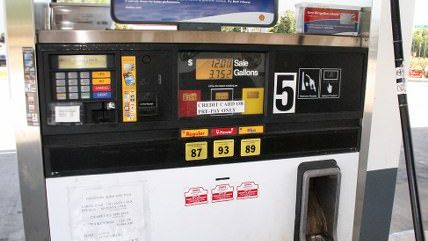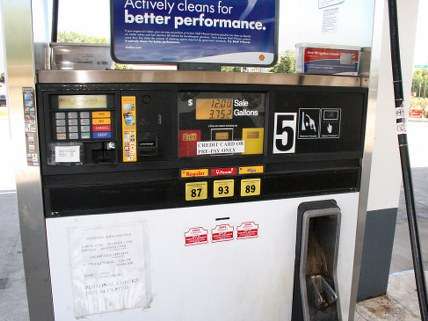Death to the Federal Gas Tax
A congressional bill would kill the gas tax and remove Washington from transportation policy.


The notion that U.S. infrastructure is crumbling and underfunded has been common lately, and more such news came in February, when the Department of Transportation (DOT) announced that the Federal Highway Trust Fund could soon run out. This spurred debate about what to do with the trust's main funding source, the federal gas tax. Some legislators have long wanted to raise this tax, and President Obama recently proposed his own $302 billion funding plan. But one Congressman, Georgia Republican Tom Graves, has a better idea: nearly abolish the gas tax altogether.
Last November, Graves introduced the Transportation Empowerment Act, which was cosponsored through Senate legislation by Republican Mike Lee. By drastically reducing the tax, it would enable states to manage their own transportation policies, improving a process that has become massively inefficient under federal oversight.
"It's rather silly," Graves told the Atlanta Journal-Constitution, that "taxpayers pay taxes at the pump that go to the federal government, [which] then tells our state how it must spend the money," even though it doesn't "give you all the money you submitted."
Currently, the $18.4 cents/gallon tax, along with an even higher diesel fuel tax, is the nation's prime source for transportation spending. Starting in 1956, the tax was funneled to the Highway Trust Fund to pay for the Interstate System, and has since funded numerous other projects. But with the rise of fuel-efficient automobiles, revenue from it has declined over the years from a high of $45 billion to somewhat more than $30 billion annually, and the fund is expected to have insufficient resources to meet all of its obligations within a year. Graves' bill would reduce the tax over five years to 3.7 cents/gallon, which could produce around $7 billion, and that money would be sent to states through block grants with few regulatory strings attached. States could then make up the difference by raising their own gas taxes.
Graves believes that this would produce more and better infrastructure, by allowing states to keep revenue that he correctly claims is not now being returned. According to a 2011 Heritage Foundation study, 28 states have a negative return on the gas taxes that they pay into the fund. Georgia, for example, is expected to have an 84 percent return in 2014—meaning a $185 million overall loss. Similar nine-figure losses are typical for Colorado, Michigan, and Texas, which has been robbed of one-fifth of its revenue since 1956.
How do such enormous sums get frittered away? Partly because of redistribution to other states. But it is also because of added costs imposed by what Graves calls the "Washington middleman."
This includes the money needed to pay for federal bureaucracy, including a Federal Highway Administration that largely duplicates the responsibilities of state DOTs. States also suffer the added costs of numerous federal regulations, many of which cater more to left-wing policy goals than actual transportation needs. Every federally-funded transportation project, for example, is subject to Davis-Bacon laws that mandate the payment of local prevailing wages. An executive order from President Obama in 2009 requires federal projects of over $25 million to use Project Labor Agreements, which discourage open bidding in favor of unionized collective bargaining. And "Buy America" provisions in the U.S. Code prevent purchases of certain foreign construction materials, even if they're cheaper. Other regulations require redundant environmental reviews and over-demanding construction standards. Former FHWA head Robert Farris has estimated that, altogether, federal regulations increase project costs by 30 percent.
Federal oversight also encourages construction of projects that make little economic sense. Before the ban in 2010, large chunks of gas tax revenue went for earmarks. This meant that, rather than receiving public input, projects were funded through amendments that were put into spending bills by politically-driven legislators. This led to numerous wasteful projects, from Alaska's "Bridge to Nowhere," to over-elaborate bus stops and transportation museums. Although Republicans have extended the earmark ban, there's no guarantee that it will be safe if Democrats reoccupy the House.
The selection process has also been inspired by urban planning dogmas that have crept from America's ivory towers into federal policy. In 1983, the Highway Fund was expanded for mass transit, and 16 percent of revenue is now dedicated to this purpose. Along with light rail, buses, and streetcars, the money goes to bike lanes, walking trails, pedestrian malls, landscaping, and other aesthetic garnish. Such transportation "alternatives" have become another way for the federal government to promote Smart Growth, but in most places, they don't move people cost-effectively.
Graves believes that by increasing local autonomy, his bill will weed out many of these misallocations. This is inspired by his belief—rooted in American federalism—that infrastructure becomes most pragmatic when funded by those who actually use it. This is in contrast, writes Nicole Gelinas in City Journal, to the impression of "free money" that localities get when receiving federal grants from taxpayers nationwide. Local control would also discourage the odd transportation policy uniformity now being imposed in a nation with vast cultural differences, from bike- and rail-obsessed Portland to Graves' rural Georgia district.
Of course the problem with his Transportation Empowerment Act may be its unlikelihood of passing. Due to political pressure, the gas tax has not been raised since 1993, causing it to lag behind inflation, but it has still been preserved because of its bipartisan appeal. Republicans like it because, by taxing consumption, it broadens the revenue base, and serves as a road fee. Democrats like it because it taxes a product considered environmentally harmful. This is why debates have been less about repealing it, than about how it can be bolstered.
But whatever is decided on should, at very least, echo Graves' focus on local empowerment. Ever since the inception of the gas tax, the federal government's role in transportation has, like with other policies, greatly expanded, even as its administrative competency has declined. As a result, transportation policy today is less about improving mobility than about politics, aesthetics, and broad social goals. This unfortunate trend has contributed to the poor state of U.S. infrastructure so apparent today.


Show Comments (162)